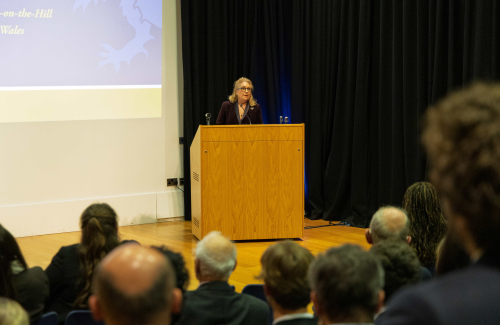More Pembroke news
Pembroke Spotlight: Dr Chinami Oka on 'Rethinking Japan's Past'
NEWS |

Pembroke's Tanaka Junior Research Fellow in Japanese Studies, Dr Chinami Oka, reflects below on what happens when we re-examine some of modern Japan's most transformative movements with a transnational perspective.
Rethinking Japan’s Past: A Transnational Approach to History
Dr Chinami Oka
Traditionally, modern historians have organised the past through the lens of the nation-state – British history, American history, Japanese history – and their international relations. This framework is so deeply embedded that it is hard to imagine history written any other way. But what if we did? What might we see?
One of the most exciting developments in historical research today is a method called transnational history, which I use to rethink some of the most well-known narratives in modern Japanese history.
My current book project, supported by the John Fell Oxford University Press Research Fund, explores that question by re-examining key moments in modern Japanese history through a transnational lens.
What I have found is that some of the most socially transformative movements in modern Japan – its first modern environmental movement, a new wave of Christianity, pioneering education for blind and deaf children, and a major strand of feminist activism – were not isolated developments. They were all interconnected as part of a broader transnational counterculture involving Japanese, Russian, American, British, and Korean grassroots actors. They shared ideas, values, and a vision of a more inclusive and less hierarchical world, challenging dominant narratives of imperialism and state-led modernisation. Some of these findings have appeared in The Historical Journal (Cambridge University Press, 2023) and in the edited volume Reopening the Opening of Japan (Leiden: Brill, 2024).
Beyond research and teaching, I am also passionate about sharing these ideas with wider audiences. I recently spoke about them in a podcast interview with the Historical Association, a leading UK organisation that promotes history education across all levels. In the episode, I discussed how even major events like the Meiji Restoration can look very different when we shift our perspective. Far from being just a story of Japan “catching up” with the West, it was also a moment of multidirectional exchange and competing, anti-imperial visions of progress.
History, in other words, is not always reducible to Western modernity. The Meiji Restoration reminds us that the past was shaped by diverse worldviews and flows of knowledge – many of which remain hidden in traditional national histories. Transnational history helps uncover those overlooked ideas and connections. It is not just about movement across borders. It is also about recognising that some people in the past did not accept the nation-state as the only way to imagine society. They envisioned something different, something more universal, and they acted on it.

